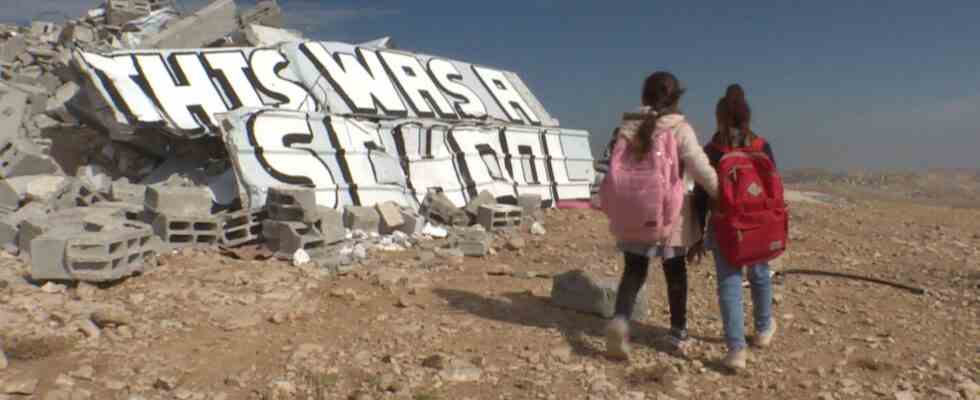Status: 06.12.2022 1:13 p.m
Dozens of schools in the occupied West Bank are threatened with demolition. According to Israeli authorities, they were built illegally. The EU, which has funded many schools, believes this violates international law.
All that is left is a large heap of rubble. A piece of corrugated iron is leaning against it, with large letters sprayed on it: “That was a school.” The 22 Palestinian elementary school children are now studying in a tent. Its thin walls offer little protection from wind and rain on the rugged hills of the southern West Bank.
“They came with bulldozers and destroyed the school, we climbed out of the windows,” says nine-year-old Deana. That was on November 23 when the Israeli military demolished the school. The one-story building was built just earlier this month with EU and EU member state funds.
Israel speaks of illegally built schools
Israeli authorities justify the demolition. A written statement said the school was an “illegally constructed building located in Fire Zone 918 south of Hebron, and the enforcement was in accordance with authority and procedure, and based on operational considerations.”
In 1981, Israeli authorities declared the approximately 3,000-hectare Masafer Yatta area a military training ground. Since then, they have repeatedly tried to evacuate the region, which is home to around 1,200 Palestinians.
The school, which was financed with EU funds, is now temporarily housed in a tent.
Image: SvdTann
More than 50 schools are threatened with demolition
Four more schools are to be demolished there. They, too, were funded by the European Union and EU member states.
In total, more than 50 schools in East Jerusalem and the Israeli-controlled areas of the West Bank are threatened with demolition. The Israeli authorities argue that they were built illegally without a building permit.
The students still remember the use of the bulldozer – they don’t know how long they can stay in the tent.
Image: SvdTann
EU criticizes Israel
“They aren’t illegal under international law,” replies Sven Kühn von Burgsdorff, EU representative in the Palestinian Territories. These schools are the facilities that the population needs to be able to live here.
The EU accuses Israel of violating international law by destroying schools and buildings. Because around 60 percent of the Israeli-occupied areas in the West Bank are under complete Israeli control.
According to international law, the occupying power, i.e. Israel, is responsible for the well-being of the population, explains the EU representative. Because Israel is not fulfilling its obligations and only approves less than one percent of Palestinian building applications for schools and other facilities, the international community must assume this obligation and build schools, for example.
Ultra-right parties are calling for more demolitions and settlement construction
The EU demands that Israel stop the demolitions. However, the opposite will probably happen with the new right-wing government in Israel. “This is our country,” says Jehonadav Weinberger, who lives in the Israeli settlement of Carmel in the south of the West Bank, a few kilometers from the recently demolished school.
He expects that what is likely to be the next government “law and order will prevail and illegal construction will stop”. At the same time, the government should give Jews more land to settle in, including in the disputed areas.
The likely new government could fulfill these wishes. Benjamin Netanyahu’s right-wing partners of choice want to take stricter action against Palestinian construction without planning permission in the West Bank, while at the same time approving more settlements for Israeli settlers. And Netanyahu depends on them to form a government.
The school children in Masafer Yatta don’t know how much longer their makeshift tent school will be there. “Even if they tear it down, we’ll stay on our land and rebuild it,” says nine-year-old Deana. The children are already used to it – the conflict is part of their everyday life.

